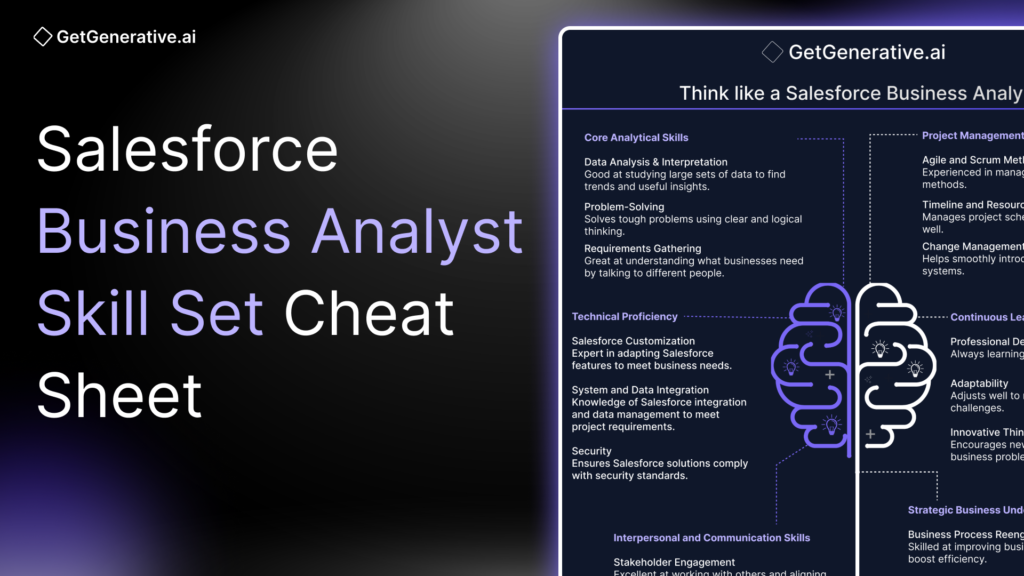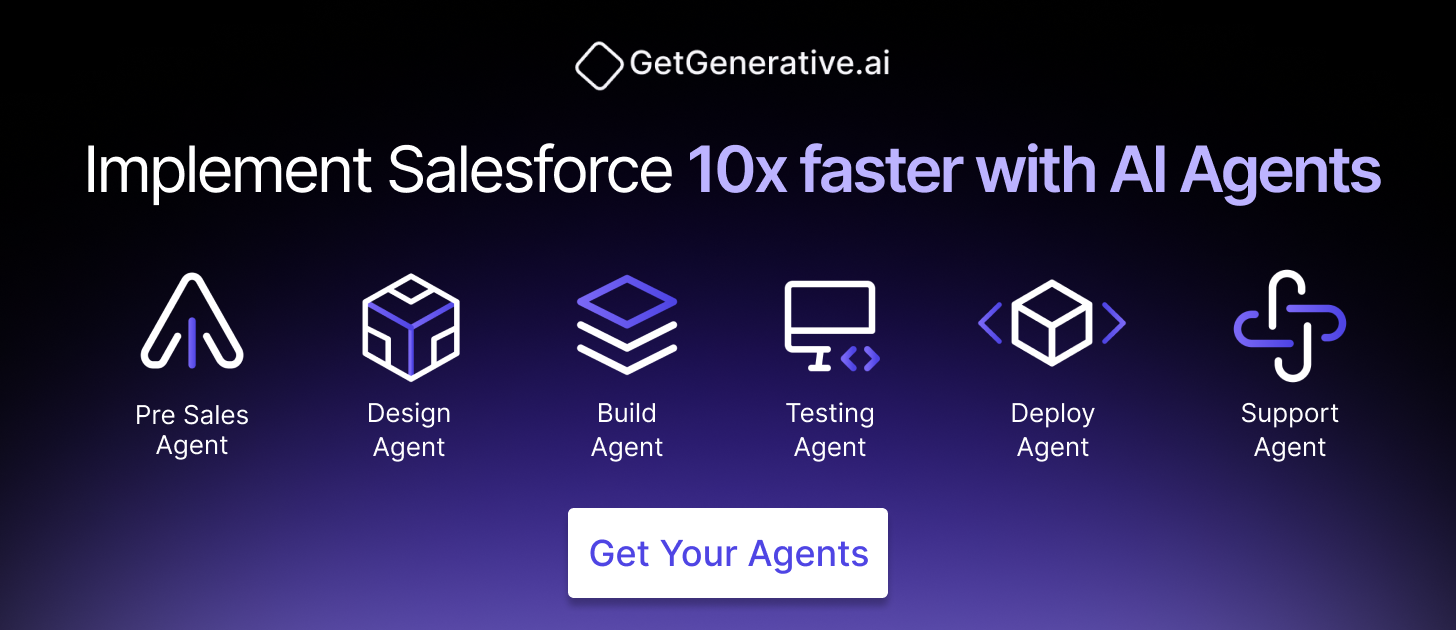Salesforce Business Analyst Skill Set Cheat Sheet
A Salesforce Business Analyst plays a pivotal role in bridging the gap between business needs and technological solutions.
Here’s a comprehensive guide to the essential skills and processes that define a successful Salesforce Business Analyst.
Key Steps for Effective Salesforce Business Analysis
1. Understanding the Context
Initial Review: A Salesforce Business Analyst begins by reviewing all available information to understand the context and scope of the project. This step is crucial for gaining a comprehensive overview of the business environment and the project’s specific requirements.
Identify Key Objectives: Clarifying the business’s objectives ensures that the analysis aligns with strategic goals. By understanding what the business aims to achieve, the analyst can tailor their approach to meet these objectives effectively.
2. Critical Questioning
Formulate Key Questions: Developing a set of targeted questions helps probe for deeper insights and identify information gaps. This step ensures that the analysis covers all necessary aspects and uncovers critical data points.
Engage Stakeholders: Interacting with stakeholders to gather diverse perspectives is essential. By using prepared questions, the analyst ensures that all voices are heard and considered, fostering a comprehensive understanding of the project’s requirements.
3. Data Gathering
Comprehensive Collection: Data is gathered from various sources, including interviews, surveys, operational data, and existing documentation. This holistic approach ensures that the analysis is based on a broad spectrum of information.
Observational Techniques: Employing observational methods helps the analyst understand workflows and processes firsthand. This direct observation can reveal insights that might be missed through other data collection methods.
4. Note-Taking and Documentation
Systematic Recording: Carefully noting down all findings and observations in a structured manner ensures data integrity and traceability. This systematic approach is vital for maintaining accurate and reliable records.
Document Patterns and Anomalies: Keeping an eye out for recurring themes or discrepancies helps identify underlying issues or opportunities. Recognizing these patterns is crucial for developing effective solutions.
5. Analysis and Synthesis
Data Analysis: Using analytical tools and techniques, the analyst dissects the collected data to understand patterns, relationships, and root causes. This step is fundamental for transforming raw data into actionable insights.
Synthesize Information: Integrating findings into a coherent narrative focuses on how individual data points relate to broader business objectives. This synthesis is key to providing meaningful and relevant recommendations.
Also Read – Salesforce Business Analyst: A Complete Guide
6. Validation and Refinement
Validate Findings: Cross-verifying data and conclusions with stakeholders ensures accuracy and relevance. This validation step is essential for building trust and confidence in the analysis.
Iterative Refinement: Refining understanding and approaches based on feedback and additional data often involves returning to earlier steps. This iterative process ensures a thorough and comprehensive approach to problem-solving.
7. Strategic Insights and Recommendations
Develop Insights: Translating analyzed data into actionable business insights is the hallmark of a successful business analyst. These insights drive strategic decisions and business improvements.
Recommend Actions: Suggesting strategic actions based on insights aligns with business goals and stakeholder expectations. Effective recommendations are practical and actionable, guiding the business toward achieving its objectives.
8. Presentation and Implementation Support
Communicate Findings: Preparing clear and persuasive presentations conveys findings, insights, and recommendations to stakeholders. Effective communication is key to ensuring that stakeholders understand and support the proposed solutions.
Support Implementation: Providing ongoing support and guidance during the implementation of recommendations ensures adherence to the proposed solutions. This support is crucial for successful execution and achieving the desired outcomes.
This cognitive process reflects how a business analyst systematically tackles complex information, focusing on delivering meaningful insights that drive business improvement. Each step builds upon the previous one, ensuring a thorough and comprehensive approach to problem-solving.
Also Read – The Ultimate Salesforce Consultant Cheat Sheet
Additional Key Skills for a Salesforce Business Analyst
Core Analytical Skills
Data Analysis & Interpretation: The ability to dissect large volumes of data, identify trends, and extract actionable insights is crucial for driving business decisions.
Problem-Solving: Utilizing logical reasoning to address complex business challenges helps provide clear and effective solutions.
Requirements Gathering: Expertise in eliciting needs from stakeholders through interviews, surveys, and observation ensures that all business requirements are thoroughly understood and documented.
Technical Proficiency
Salesforce Platform Knowledge: A deep understanding of Salesforce functionalities, customizations, and integrations is essential to optimize business processes.
Data Management Tools: Proficiency with tools like SQL for data manipulation and analysis, and familiarity with BI tools such as Tableau or PowerBI for data visualization, is vital.
System Configuration: Skills in configuring Salesforce to meet business needs, including the setup of custom fields, workflows, and user interfaces, are necessary for tailoring the platform to specific requirements.
Interpersonal and Communication Skills
Stakeholder Engagement: Effectively communicating with and managing the expectations of stakeholders at all levels of the organization ensures alignment with business objectives. This skill is crucial for maintaining strong relationships and facilitating successful project outcomes.
Presentation Skills: Being capable of synthesizing complex information into clear, persuasive presentations and reports is essential. This ability helps convey key insights and recommendations in an understandable and compelling manner.
Team Collaboration: Working seamlessly with cross-functional teams to facilitate project success demonstrates strong leadership and teamwork skills. Collaboration is vital for integrating diverse perspectives and achieving common goals.
Project Management Capabilities
Agile and Scrum Methodologies: Familiarity with agile project management frameworks allows a Salesforce Business Analyst to lead projects efficiently and adaptively. Understanding these methodologies helps in managing projects dynamically and responsively.
Timeline and Resource Management: Skills in managing project timelines, resources, and budget allocations are crucial for ensuring project deliverables are met on time and within scope. Effective resource management contributes to the overall success and sustainability of projects.
Change Management: The ability to lead and manage change is essential for ensuring the smooth transition and adoption of new processes and systems within the organization. This capability helps in minimizing resistance and maximizing acceptance of changes.
Strategic Business Understanding
Business Process Reengineering: Expertise in analyzing and redesigning business processes to enhance efficiency and productivity is key. This skill helps in optimizing workflows and improving overall business performance.
Market Analysis: Conducting market analysis to understand industry trends and align business strategies accordingly is crucial. This ability ensures that the business remains competitive and can capitalize on market opportunities.
Financial Acumen: Understanding financial metrics and their impact on business decisions enhances the ability to drive profitability through analytical insights. This knowledge is vital for making informed and strategic business decisions.
Discover more helpful Salesforce cheat sheets by visiting our Salesforce Cheat Sheets page.
Continuous Learning and Adaptation
Professional Development: A commitment to ongoing learning and certification in areas like Salesforce updates, new tools, and business analysis techniques is important. Continuous professional development ensures that the analyst remains up-to-date with the latest industry trends and best practices.
Innovative Thinking: Encouraging innovative approaches to solve business problems promotes a culture of continuous improvement. This mindset helps in finding creative and effective solutions to complex challenges.
Adaptability: Flexibility to adapt to new challenges and changes in the business environment is crucial for maintaining effectiveness across varying situations. Adaptability ensures that the analyst can respond proactively to evolving business needs.
The Future of Salesforce Business Analysis: Emerging Trends to Watch
As the Salesforce ecosystem continues to evolve, the role of the Salesforce Business Analyst is expanding beyond traditional responsibilities. Here are some emerging trends that professionals in this field should watch and prepare for:
1. AI-Driven Insights
Artificial Intelligence (AI) is revolutionizing data analysis within the Salesforce platform. Tools like Einstein AI are enabling business analysts to uncover deeper insights, predict customer behaviors, and automate routine tasks. Developing expertise in AI-driven features can significantly enhance an analyst’s effectiveness.
2. Low-Code and No-Code Solutions
With the rise of low-code and no-code tools, Salesforce Business Analysts are becoming key enablers for rapid app development. Understanding how to leverage these tools for creating custom workflows, automations, and applications without heavy coding is an invaluable skill.
3. Focus on Customer Experience (CX)
Businesses are increasingly prioritizing customer experience, and Salesforce tools are at the forefront of this shift. Analysts who can align business processes with customer-centric strategies using Salesforce capabilities will drive competitive advantages for their organizations.
4. Integration of IoT with Salesforce
The integration of Internet of Things (IoT) devices with Salesforce is opening up new avenues for data collection and business insights. Analysts familiar with IoT-driven data and its applications in customer service, predictive maintenance, and operational efficiency will stand out.
5. Sustainability and Ethical Data Practices
With growing emphasis on sustainability and data privacy, analysts are expected to navigate ethical considerations in data collection and use. Understanding regulatory compliance and championing transparent data practices will become essential responsibilities.
6. Expanding Remote Work Environments
The shift to remote and hybrid work models has influenced how businesses operate. Analysts are now focusing on enabling seamless collaboration through Salesforce tools, ensuring teams stay connected and productive regardless of their physical location.
Conclusion
This comprehensive cheat sheet offers an in-depth look at the skills and processes essential for a Salesforce Business Analyst. By mastering these areas, professionals can effectively bridge the gap between business needs and technological solutions, driving meaningful improvements and achieving strategic goals. Whether it’s through critical questioning, data analysis, stakeholder engagement, or continuous learning, each aspect plays a crucial role in the success of a Salesforce Business Analyst.
Enhance your Salesforce consulting with GetGenerative.ai. Effortlessly craft outstanding proposals, enabling you to dedicate more time to providing exceptional client service.
Start today!




